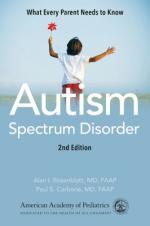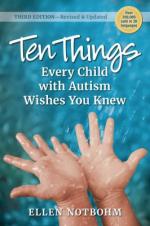April 1, 2020 | sobczakd
April is Autism Acceptance Month! Autism is a set of complex, developmental challenges that affect an individual's social skills, communication, relationships and self-regulation. About 1 in 59 children are diagnosed with autism in the United States. Want to learn more? You can contact the Autism Alliance of Michigan. The library has resources to help too!
This accessible and authoritative guide helps parents understand how autism spectrum disorder is defined and diagnosed and offers an overview of the most current behavioral and developmental therapies for children with ASD. Topics include: symptoms, accessing care, services in the community, and the role of complementary and alternative medicine. Parents will also find inspirational and relatable stories from other caretakers, helping them feel less alone.
A child's voice leads into each chapter, offering a one-of-a-kind exploration into how ten core characteristics of autism affect our children's perceptions and reactions to the surrounding physical, sensory and social environments. This revised and updated third edition sharpens the focus on these basic aspects while expanding on how our own perspectives shape the life of our child and ourselves, today, tomorrow, and for years to come. An all-new section illuminates the surprising breadth of our power of choice and outlines potent strategies for strong decision-making in every situation.
When a professional states, "Your child has Autism Spectrum Disorder (ASD)", it is enough to make your whole world fall apart. What does it mean to be on the autism spectrum? How will this affect your child's life, your life, the life of your family, and others you interact with? What sorts of medications, therapies, and alternative methods are used to help manage the disorder? What are the financial and legal ramifications? How will this affect schooling, your spiritual growth, and everyday life? These are just a few of the questions that will rapidly cross your mind.Caring for Autism: Practical Advice from a Parent and Physician delves into all these questions and more. As the father of a daughter with ASD and as a trained psychiatrist who specializes in ASD, Dr. Michael A. Ellis provides a holistic view of what comes after diagnosis. In user-friendly tones, he answers the most commonly asked questions about what it's actually like to live with ASD, what medications and therapies are available, and the global impact it has on the child's environment. With the help of his wife, Lori Layton Ellis, to provide a mother's perspective, Dr. Ellis shares personal stories of their 10-year journey in order to provide insight and support for anyone - patient, parent, caregiver - traversing the difficulties of autism.
One of the biggest fears of parents with children with autism is their looming adulthood and all that it entails. In this Second Edition of her lauded book Autism Adulthood, Susan Senator further tackles the challenges of adult life on the autism spectrum on the more severe end of the spectrum - those who cannot communicate for themselves, honestly discussing the complex decisions that await all parents and caregivers. To help parents find the guidance they need to provide fruitful lives for their autistic loved ones' and the support they themselves need, Senator shares her own family's personal story about her son, Nat, and his struggles and triumphs as an adult with severe autism.
Autism in Heels, an intimate memoir, reveals the woman inside one of autism's most prominent figures, Jennifer O'Toole. At the age of thirty-five, Jennifer was diagnosed with Asperger's syndrome, and for the first time in her life, things made sense. Now, Jennifer exposes the constant struggle between carefully crafted persona and authentic existence, editing the autism script with wit, candor, passion, and power. Her journey is one of reverse-self-discovery not only as an Aspie but--more importantly--as a thoroughly modern woman.
In 1994, Peter J. Hotez's nineteen-month-old daughter, Rachel, was diagnosed with autism. Dr. Hotez, a pediatrician-scientist who develops vaccines for neglected tropical diseases affecting the world's poorest people, became troubled by the decades-long rise of the influential anti-vaccine community and their inescapable narrative around childhood vaccines and autism. The alleged link between the two was first espoused in a fraudulent scientific paper, long since retracted, but the story shows no signs of letting up. As a result, we've seen deadly and disabling outbreaks of vaccine-preventable diseases around the country, and Texas, where Hotez lives, is at particular risk. In Vaccines Did Not Cause Rachel's Autism, Hotez draws on his experiences as a pediatrician, vaccine scientist, and father of an autistic child. Outlining the arguments on both sides of the debate, he examines the science that refutes the concerns of the anti-vaccine movement, debunks current conspiracy theories alleging a cover-up by the CDC, and critiques the scientific community's failure to effectively communicate the facts about vaccines and autism to the general public, all while sharing his very personal story of raising a now-adult daughter with autism.






